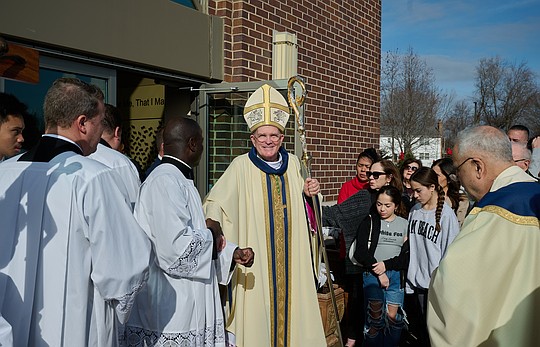World Poetry Day: Poems as prayer in different form
March 17, 2023 at 9:21 p.m.

bad manners, or cynicism is always a sign<
of things no ears have heard, no eyes have seen.You do not know what wars are going on
down there where the spirit meets the bone. – Miller Williams
A friend recently had a volume of poems published – insightful and mostly brief things that wrestle with the mysteries of love, life and faith. He told me he'd never thought of himself as a poet – or had ever tried writing verse – but, upon reembracing his Catholic faith and practicing regular prayer (which included exploring the psalter), the poems began to flow naturally from him, becoming an extension of his prayer. Prayer in a different form.
That's not surprising. The psalms are the perfect expression of the human condition in all its frailty, confusion, despair, joy and unbridled rage. They show us to ourselves, as all great poetry will, while reminding us that we are not so unique as we'd like to believe – that truly there is no human feeling that has not been felt and expressed; there is nothing new under the sun.
My friend's experience got me asking others about poems that resonate with them, teaching or consoling or amusing their souls to the point where they have committed at least some lines to memory. My own answer to that question is found in the Williams poem above, because it is so self-evidently true, and those final lines exquisitely remind us that no one gets through life unbruised by the weight of hidden crosses.
My friends offered these poems, and why they like them:
"At the Sea-Side," by Robert Louis Stevenson
When I was down beside the sea
A wooden spade they gave to me
To dig the sandy shore.
My holes were empty like a cup.
In every hole the sea came up,Till it could come no more.
"Children instantly recognize the experience he's describing," she explained, "but these lines also come to me in other contexts because of those endlessly fascinating human experiences of full vs. empty, tiny vs. immense, my own work vs. the inexorable universe. It's an ideal poem because you can take it either way."
Another friend offered "Los Heraldos Negros," by César Vallejo. "It's touched my soul ever since I learned it in a high school literature course. It describes the insignificance and strength of humanity. Or, as the poem goes, "yo no sé" ("I don't know"):
There are in life such hard blows . . . I don't know!
Blows seemingly from God's wrath; as if before themthe undertow of all our sufferings
is embedded in our souls . . . I don't know!
Dylan Thomas' "Poem in October" was cited by someone who extolled its "gorgeous scene-setting and exultant language. I love how it telescopes time."
It was my thirtieth year to heaven
Woke to my hearing from harbour and neighbour woodAnd the mussel pooled and the heron
Priested shoreThe morning beckon
With water praying and call of seagull and rookAnd the knock of sailing boats on the net webbed wall
Myself to set footThat second
In the still sleeping town and set forth.
She added, "The final line is my favorite – 'O may my heart's truth/Still be sung/On this high hill in a year's turning.'"
One gentleman shared his lasting passion for a poem many of us learned in middle school, Robert Frost's "Stopping by Woods on a Snowy Evening," for its invitation to rest: "It counters our mad rush for efficiency with a moment of sublime intentionality. ‘The woods are lovely, dark and deep/but I have promises to keep/and miles to go before I sleep.'"
My favorite response had less to do with a poem, but how memorized lines stay with us and sometimes bring us together. Of Gerard Manley Hopkins' classic, "God's Grandeur," he wrote, "I love the image of the Holy Spirit 'brooding' over the world, but it's especially dear to me because the poem makes an appearance at nearly any event featuring a group of Wyoming Catholic College students and alums. They learn 30+ poems over the course of their four years and whenever you get them together, the poetry just pours out. One of them will start off – "The world is charged…" and the entire room will pick it up in unison. I've been moved to tears by it, many times."
We think of poems and solitary things, and yet they reside within us – quiet compasses of right orientation. In prayer, especially, they are knowing and comfortable friends.
Elizabeth Scalia is culture editor for OSV News. Follow her on Twitter @theanchoress.
Related Stories
Friday, January 02, 2026
E-Editions
Events
bad manners, or cynicism is always a sign<
of things no ears have heard, no eyes have seen.You do not know what wars are going on
down there where the spirit meets the bone. – Miller Williams
A friend recently had a volume of poems published – insightful and mostly brief things that wrestle with the mysteries of love, life and faith. He told me he'd never thought of himself as a poet – or had ever tried writing verse – but, upon reembracing his Catholic faith and practicing regular prayer (which included exploring the psalter), the poems began to flow naturally from him, becoming an extension of his prayer. Prayer in a different form.
That's not surprising. The psalms are the perfect expression of the human condition in all its frailty, confusion, despair, joy and unbridled rage. They show us to ourselves, as all great poetry will, while reminding us that we are not so unique as we'd like to believe – that truly there is no human feeling that has not been felt and expressed; there is nothing new under the sun.
My friend's experience got me asking others about poems that resonate with them, teaching or consoling or amusing their souls to the point where they have committed at least some lines to memory. My own answer to that question is found in the Williams poem above, because it is so self-evidently true, and those final lines exquisitely remind us that no one gets through life unbruised by the weight of hidden crosses.
My friends offered these poems, and why they like them:
"At the Sea-Side," by Robert Louis Stevenson
When I was down beside the sea
A wooden spade they gave to me
To dig the sandy shore.
My holes were empty like a cup.
In every hole the sea came up,Till it could come no more.
"Children instantly recognize the experience he's describing," she explained, "but these lines also come to me in other contexts because of those endlessly fascinating human experiences of full vs. empty, tiny vs. immense, my own work vs. the inexorable universe. It's an ideal poem because you can take it either way."
Another friend offered "Los Heraldos Negros," by César Vallejo. "It's touched my soul ever since I learned it in a high school literature course. It describes the insignificance and strength of humanity. Or, as the poem goes, "yo no sé" ("I don't know"):
There are in life such hard blows . . . I don't know!
Blows seemingly from God's wrath; as if before themthe undertow of all our sufferings
is embedded in our souls . . . I don't know!
Dylan Thomas' "Poem in October" was cited by someone who extolled its "gorgeous scene-setting and exultant language. I love how it telescopes time."
It was my thirtieth year to heaven
Woke to my hearing from harbour and neighbour woodAnd the mussel pooled and the heron
Priested shoreThe morning beckon
With water praying and call of seagull and rookAnd the knock of sailing boats on the net webbed wall
Myself to set footThat second
In the still sleeping town and set forth.
She added, "The final line is my favorite – 'O may my heart's truth/Still be sung/On this high hill in a year's turning.'"
One gentleman shared his lasting passion for a poem many of us learned in middle school, Robert Frost's "Stopping by Woods on a Snowy Evening," for its invitation to rest: "It counters our mad rush for efficiency with a moment of sublime intentionality. ‘The woods are lovely, dark and deep/but I have promises to keep/and miles to go before I sleep.'"
My favorite response had less to do with a poem, but how memorized lines stay with us and sometimes bring us together. Of Gerard Manley Hopkins' classic, "God's Grandeur," he wrote, "I love the image of the Holy Spirit 'brooding' over the world, but it's especially dear to me because the poem makes an appearance at nearly any event featuring a group of Wyoming Catholic College students and alums. They learn 30+ poems over the course of their four years and whenever you get them together, the poetry just pours out. One of them will start off – "The world is charged…" and the entire room will pick it up in unison. I've been moved to tears by it, many times."
We think of poems and solitary things, and yet they reside within us – quiet compasses of right orientation. In prayer, especially, they are knowing and comfortable friends.
Elizabeth Scalia is culture editor for OSV News. Follow her on Twitter @theanchoress.










